Sept. 1, 2022
Publications

♾️ follow Marie-Anne Frison-Roche on LinkedIn
♾️ subscribe to the Newsletter MAFR Regulation, Compliance, Law
____
► Full Reference: M.-A. Frison-Roche, "Place et rôle des entreprises dans la création et l'effectivité du Droit de la Compliance en cas de crise" ("Place and rôle of Companies in the Creation and Effectiveness of Compliance Law in Crisis"), in M.-A. Frison-Roche (ed.), Les Buts Monumentaux de la Compliance, coll. "Régulations & Compliance", Journal of Regulation & Compliance (JoRC) and Dalloz, 2022, p. 339-352.
____
📝read the article (in French)
____
🚧read the bilingual Working Paper which is the basis of this article, with additional developments, technical references, and hyperlinks
____
📕read a general presentation of the book, Les Buts Monumentaux de la Compliance, in which this article is published
____
► Summary of the article (done by the Journal of Regulation & Compliance): This article has a very topic: the place of private Companies, regarding the chapter's issue: "the ordeal of a crisis". The crisis constitutes a "test" it brings evidence. Let us take it as such.
Indeed, during the health crisis, Companies have helped the Public Authorities to resist the shock, to endure and to get out of the Crisis. They did so by force, but they also took initiatives in this direction. From this too, we must learn lessons for the next crisis that will come. It is possible that this has already started in the form of another global and systemic crisis: the environmental crisis. In view of what we have been able to observe and the evolution of the Law, of the standards adopted by the Authorities but also by the new case law, what can we expect from Companies in the face of this next Crisis, willingly and strength?
________

June 21, 2022
Publications

♾️ follow Marie-Anne Frison-Roche on LinkedIn
♾️subscribe to the Newsletter MAFR Regulation, Compliance, Law
____
► Full Reference: Frison-Roche, M.-A. Compliance, Artificial Intelligence and Business Management: the right measure, Working Paper, June 2022.
____
► Summary of the Working Paper: Of the next European Regulation on artificial intelligence, the European Commission has a quite neutral conception of AI for obtaining a consensus between the Member States, while the Regulators and certain States have a more substantial conception of technology, wanting its power to be used to protect people, firstly from these new tools themselves, secondly from what is an amplification of the evils of the classic world, such as hate or misinformation. This is the reflection of two conceptions of Compliance.
Firstly, Compliance can be defined as neutral processes that increase the effectiveness of what would be the obligation for companies or their desire for efficient risk management (in particular the consideration of "legal risks") to prove being "conform" to all regulations that are applicable to itself and all persons to whom the firm is accountable. This is often referred to as the "compliance obligation" or "obligation of conformity".
This conception implies considerable practical consequences for the company which, in order to succeed in this "total exploit", would then have to resort to artificial intelligence tools constituting a "total and infallible solution", which mechanically generate for it the obligation to "know " all the "regulatory mass", to detect all "non-compliances", to conceive its relationship to the Law in terms of "risk of non-compliance", fully supported by Compliance by Design which could, without human intervention , eliminate legal risk and ensure "compliance total efficiency" in Ex Ante.
The "legal price" of this technological dream is extremely high because all the "regulatory" requirements will then be transformed into obligations of result, any failure generating liability. The Compliance probationary system will become overwhelming for the company, both in terms of burden of proof, means of proof, and transfers, without exemption from proof. Objective responsibilities for others will multiply. The "law of conformity" will multiply Ex Ante systemic penalties, the border with criminal law being less and less preserved.
It is essential to avoid this, both for businesses and for the Rule of Law. For this, we must use Artificial Intelligence to its proper extent: it may constitute a "massive aid", without ever claiming to be a total and infallible solution, because it is the human who must be at the center of the compliance system functioning thank to the firms and not the machinery.
For this, it is necessary to adopt a substantial conception of Compliance Law (and not a sort of Conformity Law or Obedience Law). It does not at all cover all the applicable regulations and it is not at all "neutral", being in no way a series of processes. This new branch of Law is substantially built on Monumental Goals. These are either of a negative nature (preventing a systemic crisis from happening, in many but specific perspectives: banking, financial, health, climate, etc.), or of a positive nature (building a better balance, in particular between human beings, in the company and beyond).
In this conception which appears increasingly strongly, artificial intelligence finds its place, more modest. As Compliance Law is based on information, Artificial Intelligence is essential to capture it and make first connections, first stages for successive analyses, done by human beings, making what is essential: the commitment of the company, both by the leaders and by all those who are "embarked" by a "culture of Compliance" which is at both built and common.
This restores the required seal between Criminal Law and what can be asked of the mechanical use of Artificial Intelligence; this puts the obligation of means back as a principle. This restores the principal place to the lawyer and the compliance officer, so that the culture of compliance is articulated with the specificities of a sector and the identity of the company itself. Indeed, the culture of compliance being inseparable from a culture of values, Compliance by design requires a dual technique, both mathematical and legal culture. It is why European Compliance Law, because it is rooted in the European humanist tradition, is a model.
________

Updated: Sept. 25, 2021 (Initial publication: March 25, 2021)
Publications

 ► Référence complète : Frison-Roche, M.-A., Instituer l'insécurité juridique comme principe, outil de prévention des crises systémiques catastrophiques totales, document de travail, mars et septembre 2021.
► Référence complète : Frison-Roche, M.-A., Instituer l'insécurité juridique comme principe, outil de prévention des crises systémiques catastrophiques totales, document de travail, mars et septembre 2021.
____
► Ce document de travail fait suite à deux précédents documents de travail, réalisés pour le colloque qui s'est tenu à la Cour de cassation le 22 mars 2021.
Le premier avait été conçu et en partie réalisé longtemps avant sa tenue pour traiter le sujet selon les canons habituels attendus ;
Le second a été élaboré le veille de sa tenue sur 4 cas car la disparition de mes serveurs en raison d'un incendie, ayant également touché les copies de ceux-ci ne me permettait pas autre chose, les organisateurs m'ayant demandé de maintenir pourtant ma participation, ce dont je les remercie 📎
Le présent document de travail a été élaboré après la tenue du colloque afin que les organisateurs de ce colloque, au thème si aventureux, ne pensent pas qu'ils ne pouvaient pas compter sur moi.
Ce document de travail vise à dépasser ces avanies et à opérer la connexion du sujet pour lequel une contribution m'a été demandée (la crise économique) avec le sujet plus général qui me retient par ailleurs : la construction de la nouvelle branche qu'est le Droit de la Compliance, pourquoi le faire et comment le faire.
____
Introduction : Comme à tous, ce sujet de "L'insécurité juridique" me pose difficulté. Parce que, n'étant pas grand personnage solitaire affrontant l'inconnu, comme tous les autres je voudrais plutôt la sécurité que l'insécurité, et tous les mots qui ne commencent pas par une négation : je voudrais le connu plutôt l'inconnu, je voudrais être comprise qu'incomprise, et ce n'est plus par confort que par urgence morale je voudrais vivre dans un monde juste plutôt que dans un monde injuste. C'est d'ailleurs pour cette dernière raison que je vais affronter l'aventure de l'Insécurité juridique comme principe premier, et non pas comme exception au principe de la Sécurité juridique 📎
Cet ajout du "in" signale paradoxalement un retranchement : le "in" montre ce qui manque, comme le monde blessé qu'est le monde injuste. Me voilà invitée à traiter un sujet par avance abîmé, car l'insécurité juridique c'est déjà comme une agression : un monde amputé de sa sécurité, comme c'est désagréable.
C'est encore plus vrai pour "l'insécurité juridique". En effet, la notion fait face à la "sécurité juridique", cette sorte d'apport spécifique que le Droit offre au monde. La "sécurité juridique" est aujourd'hui comme un Totem, qui serait indissociable du Tabou de l'Insécurité. Dans le monde juridique épuisé dans lequel nous ne serions plus aptes qu'à proposer quelques notions procédurales, surtout pas de notions substantielles car immédiatement taxées d'être trop politiques 📎
La sécurité juridique, parce que les systèmes juridiques n'auraient plus que cela à offrir, revendiquant par ailleurs leur neutralité et se rejoignant donc sur cette constance, cette cohérence, et cette confiance produites par cette sécurité, est notre nouveau doudou.
A cela, l'on apporte nuances dans les modalités, en soulignant que les circonstances changeantes de la vie exigent un peu de flexibilité, que le pragmatisme et des situations concrètes et particulières qui sans cesse varient impliquent de prévoir dès aujourd'hui que demain le contexte aura changé : il faut organiser de la prévisibilité dans le changement. De cela, le Droit souple s'en charge, les lignes directrices étant les nouvelles voies romaines qui nous montreront le chemin. Sécurité et flexibilité, dans un pragmatisme qui voit dans tout principe substantiel un signe de rigidité, voilà notre nouveau mantra.
L'insécurité juridique est ainsi notre Tabou, dont les admissions justifiées seraient autant d'hommages rendus au Totem de la sécurité juridique, Totem et Tabou se renforçant toujours. Il y aurait donc imperfection du système juridique si l'on haussait l'insécurité au rang de véritable principe. C'est pourquoi lorsqu'on fait l'effort de parler d'insécurité juridique, on semble ne le faire que sur le mode de l'exception : l'insécurité juridique, cela serait ce qu'il est admissible de supporter comme exception légitime au principe de la sécurité juridique 📎
L'on aura donc tendance à traiter de l'insécurité juridique comme une sorte de principe supportable lorsque quelque chose justifie qu'on porte atteinte au véritable principe premier qu'est la Sécurité juridique. C'est ailleurs ainsi le plus souvent qu'on l'aborde . Ce n'est donc pas le traiter comme un véritable principe, juste comme une exception supportable.
Voilà pourquoi l'on m'a demandé d'examiner si l'insécurité juridique était supportable, admissible, lorsqu'il y a crise économique. Sans doute parce que lorsqu'il y a crise économique, alors tant pis les principes doivent un peu baisser pavillon et l'on fait avec les moyens du bord en admettant des exceptions, bien qu'avec beaucoup de réticences et de regrets 📎
L'insécurité juridique n'aurait donc qu'un temps, parce que par nature la crise elle-même n'a qu'un temps. La fin de la crise, la fin des problèmes et d'une situation anormale feraient disparaître le principe d'insécurité juridique, lequel serait donc un principe pathologique.
Mais ce n'est pas parce que cette description semble partagée par beaucoup que ses prémisses soient exacts. En effet, la "crise" est-elle si exceptionnelle que ce qui justifie que l'insécurité juridique, qui permet d'aider à sa résolution, le soit aussi ? Si l'on constate plutôt que la crise est non seulement notre "ordinaire", et qu'en plus notre "ordinaire catastrophique" est "prévisible", voire virtuellement déjà là, et qu'en plus dans le futur, ce qui risque d'arriver est une crise catastrophique totale qui pourrait bien être définitive dans ses effets (ce qui enlève à la crise sa nature temporaire et le retour au "vrai principe" également), alors le principe exceptionnel, cantonné dans la crise, doit sortir de l'hypothèse de celle-ci pour venir pleinement dans le Droit présent afin d'empêcher que se réalise cet ordinaire catastrophique.
Oui, regardons vers le futur : ne sont-ce pas de monumentales crises qui sont devant nous ? Et l'enjeu n'est-il pas d'adopter des principes premiers pour qu'elles n'adviennent pas ? S'il en est ainsi, alors l'absence de changement, la constance et le prévisible, c'est-à-dire le principe même de la Sécurité juridique, si choyé, n'est-ce pas ce qui fait obstacle à la prévention de l'advenance des crises économiques qui nous menacent ? Certes c'est sans doute une crise sanitaire et une crise écologique et climatique qui nous sont devant nous, mais de la même façon la crise économique de 2020 n'est elle-même qu'un accessoire de la crise sanitaire mondiale, prémisses de ce qui pourrait arriver.
Si nous sommes dans cette situation mondiale alors, ce n'est pas une conception procédurale des principes qu'il faut retenir, mais une conception politique. De la même façon, dans cette perspective ce n'est pas en terme d'exception, de "principe exceptionnel" mais bien en terme de principe premier qu'il faut penser l'Insécurité juridique, c'est-à-dire en terme d'éveil et d'aventure, car demain pourrait n'être pas du tout comme aujourd'hui. Seul le principe inverse de l' "Insécurité juridique" pourrait alors exprimer la volonté d'y répondre (II).
_____
► Lire ci-dessous les développements du document de travail ⤵
L'incendie d'OVH peut simplement être pris comme un exemple de crise. V. infra ⤵
Ce qui occupe la seconde partie de la présente étude.
Ainsi le Droit de la Compliance a longtemps été présenté comme une simple procédure d'effectivité des règles, ce qui rassure, plutôt que ce qui est sa définition substantielle, à savoir des "Buts Monumentaux", notamment sociaux et climatiques, qui lui donne toute son ampleur et révèle sa nature profondément politique. V. Frison-Roche, M.-A. ✏️Notes pour une synthèse opérée sur le vif des travaux du colloque : "Les Buts Monumentaux du Droit de la Compliance : radioscopie d'une notion" la notion de Buts Monumentaux du Droit de la Compliance, 2021 ; et voir plus généralement Frison-Roche, M.-A. (dir), 📕 Les Buts Monumentaux de la Compliance, 2022.
Contre cela, Frison-Roche, M.-A., Non, je n'aime pas la réglementation, septembre 2021.
Il en est de même du principe de proportionnalité. Mais là aussi il serait adéquat de penser les choses différemment. Voir une démonstration dans ce sens, Frison-Roche, M.-A., Définition de la proportionnalité et Définition du Droit de la Compliance, 2021.
Pour une description du choc que la loi déclarant "l'Etat d'urgence sanitaire" fit sur la doctrine juridique, Gelbrat, A. et , Etat d'urgence sanitaire : la doctrine dans tous ses états, 2020.
Ce sont souvent dans ces termes que la doctrine s'exprime. Par exemple 📝Kamgaing, P.-C., Crise sanitaire et procédures judiciaires : étude de droit processuel, 2020, évoquant le fait que le droit processuel est "bafoué".

May 15, 2021
Publications

 Full Reference: Frison-Roche, M.-A. Place and Role of Companies in the Creation and Effectiveness of Compliance Law in Crisis, Working Paper, May 2021.
Full Reference: Frison-Roche, M.-A. Place and Role of Companies in the Creation and Effectiveness of Compliance Law in Crisis, Working Paper, May 2021.
____
This Working Paper has been elaborated as basis for a conference in the colloquium of Mai 17, 2021 (done in French: Normes publiques et Compliance en temps de crise : les buts monumentaux à l'épreuve.
This video is made with English substitutes.
It is also the basis for an article in the book Compliance Monumental Goals, the English version of which is co-published by the Journal of Regulation & Compliance (JoRC) and Bruylant.
Summary: This article has a very topic: the place of private Companies, with regard to the chapter's issue: "the ordeal of a crisis". The crisis constitutes a "test", that is to say, it brings evidence. Let us take it as such.
Indeed, during the health crisis, it appears that Companies have helped the Public Authorities to resist the shock, to endure and to get out of the Crisis. They did so by force, but they also took initiatives in this direction. From this too, we must learn lessons for the next crisis that will come. It is possible that this has already started in the form of another global and systemic crisis: the environmental crisis. In view of what we have been able to observe and the evolution of the Law, of the standards adopted by the Authorities but also by the new case law, what can we expect from Companies in the face of this next Crisis, willingly and strength
Lire ci-dessous les développements.
March 24, 2021
Thesaurus : Doctrine
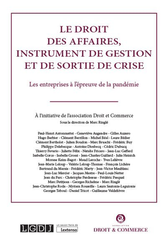
Référence complète : Association Droit et Commerce (sous la direction de Marc Ringlé), Le droit des affaires, instrument de gestion et de sortie de crise. Les entreprises à l'épreuve de la pandémie, LGDJ, 2021, 453 p.

Feb. 25, 2021
Publications
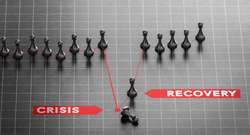
Référence complète : Frison-Roche, M.-A., La "crise économique", la concevoir et intégrer ouvertement de l'insécurité juridique. Comment la concevoir ? Quel régime juridique concevoir pour une insécurité juridique admise, voire requise ?
Ce document de travail a été élaboré pour servir de base à une intervention : L'avenir de la notion d'insécurité juridique au regard du traitement des situations extraordinaires : crise économique, dans le colloque "Insécurité juridique : émergence d'une notion ?, Cour de cassation, 22 mars 2021, Paris.
___________
"whatever it takes"
A un moment, le maître se lève. Si la position royale est la position assise lorsque, pondéré, il écoute et juge, c'est en se levant qu'il montre son acceptation d'être aussi le maître parce qu'il est en charge de plus et qu'il fera usage de tout pour gagner.
A situation financière exceptionnelle, tous les moyens de politique monétaire sont donc bons. C'est ce qui fût dit. Sans aucune limite. Et ce ne n'est pas un principe comme celui de la sécurité juridique, ayant permis à des personnes de jouer de leurs droits, par exemple celui de spéculer, d'engranger par avance des prérogatives sur la situation de demain, qui aurait pu empêcher cette puissance de jure permettant de sauver l'Europe. Car à prendre littéralement la formule, même si c'est au prix des droits acquis et des règles précédemment posées qu'il aurait valu payer, s'il avait valu faire page blanche pour en écrire de toutes nouvelles pour sauver l'Europe, la plume de Draghi les aurait tracées sans s'arrêter à cela. Ainsi, par une telle formule c'est par la Grande Porte, celle de la crise économique et financière, que l'insécurité juridique est entrée dans le Droit.
Dans le cas de la crise de 2008, la parole suffît puisque la perspective d'une intervention sans limite du pouvoir monétaire sans limite de la Banque centrale fit que les agissements spéculatifs dévastateurs ne déferlèrent pas. Avoir levé la règle de Droit en ce qu'elle suppose la limite en affirmant qu'il y aurait prévalence absolue du but, suffît donc en Ex Ante pour que la crise ultime ne s'ouvre pas. Cet épisode, digne d'Homère, suffit à éclairer l'insécurité juridique par une de ses dimensions lorsqu'elle est non seulement admissible mais requise : elle peut constituer un acte héroïque.
Dans une telle perspective, plutôt que de laisser l'insécurité juridique dans l'ombre ce qui ne serait qu'une sorte d'imperfection (parce que l'insécurité juridique ne serait donc que l'imperfection de la sécurité juridique), par l'idée par le "légalisme" devrait avoir des limites, que "le Droit n'est pas tout" et qu'il faudrait savoir "fermer les yeux"..., il faudrait plutôt assumer de dire que certaines circonstances il faut dire haut et fort, c'est-à-dire le dire de jure , l'insécurité juridique est légitime, licite, conforme à la hiérarchie des normes juridiques.
En cela, dessiner le concept positif de l'insécurité juridique (ce qui ne peut que plaire aux hégéliens), accroît la sécurité juridique : ainsi cela permet d'associer aux hypothèses d'insécurité juridique un régime juridique plus clair. En effet, plutôt que de mettre sous le tapis le Droit, ce qui explique bien des tensions entre le Conseil constitutionnel et le Conseil d'Etat d'une part et le Législateur et le Gouvernement d'autre part concernant "l'Etat d'urgence", l'on pourrait disposer des conditions dans lesquelles l'insécurité juridique permet d'écarter ou de limiter des règles.
Il est posé comme hypothèse qu'à l'avenir une certaine doser d'insécurité juridique pourrait être ouvertement admise : cela serait donc juridiquement conçu, le Droit gagnant toujours avancer à visage découvert. Même si l'on apprécie la "flexibilité" du Droit, il est toujours dangereux en Droit d'affirmer appliquer des règles tout en ne les appliquant pas.
L'idée proposée est donc que dans des "situations extraordinaires", l'insécurité juridique serait une dimension, voire un principe admissible. Et développant ce premier point il est proposé que l'hypothèse d'une "crise économique" justifie une dimension, voire un principe d' "insécurité juridique".
Mais cette première affirmation est à éprouver. En effet, une crise économique, notion qu'il convient de définir, si elle doit avoir un effet si majeur de retournement, est-elle une "situation" si extraordinaire que cela ?
En outre, pour traiter cette situation extraordinaire que constitue une "crise économique", quelle dose d'insécurité juridique serait juridiquement admissible, voire pourrait être juridiquement revendiquée ? Voire pourrait-on concevoir un renversement de principe qui conduirait le Droit applicable à une crise économique sous l'égide de l'insécurité juridique ?
Dans un tel cas, la question qui se pose alors est de déterminer les conditions et les critères de la sortie de la crise économique, voire de déterminer les éléments de perspective d'une crise économique, qui pourrait justifier par avance l'admission d'injection d'insécurité juridique. Le Droit a avant tout maîtriser sur le temps futur.
Intervention du 27 juillet 2015.
Sur la mise en perspective de l'affirmation d'Emmanuel Macron par rapport à l'affirmation de Mario Draghi.
Pour une perspective plus simplement financière, qui s'exprime du coup par une autre formule : Whatever it cost, v. Bessa- Quéré, A., 27 février 2021.
Dec. 8, 2020
Thesaurus : Doctrine

► Référence complète : J. Chevallier, "L'État", in J.-B. Racine (dir.), Le droit économique au XXIe siècle. Notions et enjeux, LGDJ, coll. "Droit & Économie", 2020, pp. 349-364
____
📕consulter une présentation générale de l'ouvrage, Le droit économique au XXIe siècle. Notions et enjeux, dans lequel cet article est publié
____
► Résumé de l'article :
____
🦉Cet article est accessible en texte intégral pour les personnes inscrites aux enseignements de la Professeure Marie-Anne Frison-Roche
________
Oct. 20, 2020
Thesaurus : Doctrine

April 24, 2020
Publications

Its subject is the confrontation between the current health crisis situation and the Compliance Law.
Summary. After defining Compliance Law, distinguishing the procedural and poor definition and the substantial and rich definition, the starting point is to admit the aporia: the type of health crisis caused by Covid-19 will be renewed and it is imperative to prevent it, even to manage it, then to organize the crisis exit. Public Authorities are legitimate to do so, but because this type of crisis being global and the State being consubstantially linked to borders, States are hardly powerful. Their traditional International Law shows their limits in this current crisis and one cannot hope that this configulration will improve radically.
In contrast, some companies and markets, notably the financial markets, are global. But the markets are not legitimate to carry out such missions and counting on the generosity of certain large companies is far too fragile in front of the "monumental goal" that is the prevention of the next health crisis, crisis which must never happen.
How to get out of this aporia?
By Compliance Law, basis of, in a literal and strong sense, the "Law of the Future".
We need to be inspired by the Banking and Financial Compliance Law. Designed in the United States after the 1929 crisis to tend towards the "monumental goal" of the absence of a new devastating crisis in the country and the world, this set of new legal mechanisms gave duty and power of supervision, regulation and compliance to market authorities and central bankers. These are independent of governments but in constant contact with them. Today, they claim to have as first priority the fight against climate change. Now and for the future, they must also be given the responsibility and the powers to prevent a global health disaster, similar to a global ecological disaster, similar to a global financial disaster. This does not require a modification of the texts because their mandate consists in fighting instability. Stability must become a primary legal principle, of which the fight against monetary instability was only a first example. By the new use that central banks must make of it by preventing and managing health crises, Compliance Law will ensure that the future will be not catastrophic.
Jan. 16, 2020
Thesaurus : Doctrine
Reference: Patrick BOLTON - Morgan DESPRES - Luiz Awazu PEREIRA DA SILVA - Frédéric SAMAMA - Romain SVARTZMAN, The green swan: central banking and financial stability in the age of climate change, Banque des Règlements Internationaux, Janvier 2020
July 17, 2019
Thesaurus : Doctrine
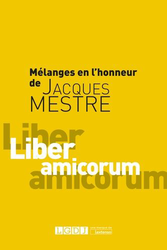
Full reference: Roda, J.-C., La crise du droit antitrust in Mélanges en l'honneur de Jacques Mestre, coll. Mélanges, LGDJ-Lextenso, 2019, p. 839-854
Sciences Po's students can read the article via MAFR Sciences Po's Drive Regulation & Compliance
June 20, 2019
Publications
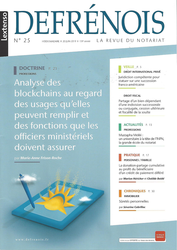
Référence complète : Frison-Roche, M.-A., Analyse des blockchains au regard des usages qu'elles peuvent remplir et des fonctions que les officiers ministériels doivent assurer, in Revue Défrenois, Lextenso, n°25, 20 juin 2019, pp. 23-29.
Résumé : La blockchain est une technologie qui n'est pas, en soir, bonne ou mauvaise. Elle est plus ou moins adaptée aux fonctions qu'elle est apte à remplir. Ce qu'il faut ensuite confronter aux fonctions que l'État a dévolues aux officiers ministériels. Or, autant les fonctions de conservation et de duplication des actes gagnent à être transférées et développées dans cette technologie, autant la fonction d'élaboration des instrumentums ne peut être assumée que par des officiers ministériels auxquels l'État demande de vérifier la correspondance entre les mentions des instrumentums et la réalité des négotiums, ce que seuls des êtres humains peuvent mener et ce qu'aucune machine ne peut faire.

Updated: May 27, 2019 (Initial publication: May 13, 2019)
Publications

First of all, this working document was used as a support for an oral intervention done in French on the general topic. L'officier ministèriel est-il soluble dans la blockchain ? (Is the ministerial officer soluble in the blockchain?) at the "Club du Droit", which took place at the Conseil supérieur du Notariat on May 14, 2019, in Pars.
Consult the general presentation of the conference (in French).
Then it serves as a basis for an article to be published in the Revue Defrénois (in French).
______
Introduction & Summary.
The technical analysis of the confrontation between the tool that is the blockchain and the function that ensure these particular people who are the "ministerial officers"
For this, it is necessary to keep in mind this distinction so simple: the blockchain is a tool, a thing, a machine, an algorithm, a mechanical, mathematical power, while the ministerial officer is a human being.
This refers to the distinction that the Western legal system, whether Civil Law or Common Law, poses as summa divisio: the distinction between human beings and things. This first distinction is formulated so that we do not treat human beings as things, since they are legally qualified as "person"
For this essential distinction to remain effective, not only should we not imagine human beings as things (reduced to their bodies, for example, or reduced to mechanical acts of consumption
But technology represents more and more things with anthromophormi forms and reactions , through robots which "speak", "intelligent" machines, etc. The economic success of promoters of machines and other human-like robots, mechanical solutions presented as "intelligent", is based on forgetting the distinction between the person and things. It is certainly possible to erase this distinction from our system of thought. The difficulty is that it is the basis of Western Lawl
It is this background that is played in the practical questiond of insertion of blockchains and other technologies and the way in which the various professions must exercise their functions today. If these tools are consistent with these functions, or even improve them, professionals must welcome them without suspicion, or even participate directly in developing them. If these tools are not capable of fulfilling certain functions entrusted to these professionals, then these functions must not be inadvertently or maliciously inserted into a blockchain, whose capacity for preservation and reliability does not amount to anything, because a thing doesn't have any ability to think.
This is why we must start from the functions, by dinstinguising the technical function of conservation, duplication and elaboration of acts (I).
It seems that assuming the technical reliability of preservation and duplication acquired through the blockchain, as soon as there is a part of elaboration in the act, human intervention must step in because a machine is unfit to check the facts. Here we find the distinction between the retranscribed negotium, this retranscription never being mechanical, and the instrumentum itself, which, split from what gave rise to it, can be subjected to duplicative and conservation technologies. These technologies of conservation and duplication could be so efficient that the notions of original and copy could be questioned because of the reliability of the blockchain (II).
Thus the blockain is an effective technology on the instrumentum as documents divided from the negotium, but it can not guarantee the correspondence between the two ; it has only the reliability in the conservation, the availability and the duplication to infinity of the instrumentum, of what is extremely useful, and justifies that ministerial officers incorporate this technology. But the function of these are not limited to being agents of conservation and duplicators. We do not simply move from the copyist monk to the blockchain. The main and so precious function of the ministerial officers is to check the accuracy of the mentions of the instrumentum in relation to the reality of the negotium. This is so precious for a market economy to have this correspondance
This would be the choice of a very liquid and unsecured market (without intermediary, with the benefit of lower cost in Ex Ante and higher risk for the long term). In policy, the balance is always between security and liquidity, especillay in financial systemic policy. This was done by American Law, wich prefered low costs and high liquidity, especially for real estate loans, which were securitized by subprime mortgages. For the moment, this choice is not made in this sense by European Law, safety concern in the elaboration of the acts being preferred and the distinction between the human aptitude and the mechanical aptitude remaining. And we know that in the first system the reajustment takes the form of a general crisis, which reinjects the reality of the negotiums, lost in the instrumentums. What price are we ready to pay ?
Once this distinction is clearly made, because the elaboration of an acte mus be made bye the ministerial officer, human being invested by the State of the particular charge ensures the accuracy of the mentions of the act with the reality of people, wills, obligations and goods, it is all the more expedient for ministerial officiers to organize themselves to develop blockchain technology. Indeed, once this act has been developed reliably, ans as such deserves to be "authentic", because of the continuum between elaboration, preservation and duplication, because it is up to the ministerial officiers to draw up the deeds more incontestably reliable. It is up to them to equip themselves with the technological means of best conservation and duplication of acts elabored by them (IV).
Sur la confrontation déjà faite dans l'analyse économique de la "régulation" et la fonction notariale, v. Frison-Roche, M.-A., ....
Frison-Roche, M.A., Pour protéger les êtres humains, la nécessité éthique de la notion juridique de personne, 2018.
Anders, G., notamment dans son ouvrage central L'obsolescence de l'homme (1956), présentant l'être humain réduit à l'état de "machine désirante" par une société de pure et simple consommation. Le souci qu'il en a comme philosophe rejoint le souci qu'en avait Jacque Ellul, comme juriste, s'inquiétant de la "société technicienne" (...). Or, les machines correspondent aujourd'hui au dessin que ces auteurs du milieu du XXième siècle en faisaient. De la même façon, Alain Supiot rapporte à Kafka le souci du "machinisme" dans le fonctionnement des institutions humaines (....) ; il ne fait notamment dans son analyse de Kafka comme "artiste de la Loi" (2019).
Par exemple Supiot, A., La gouvernance par les nombres, 2015 ; Mondialisation ou globalisation ? Les leçons de Simone Weil, 2019 ; Le droit au XXIème siècle : droit, technique et écoumène (dernière leçon au Collège de France, 22 mai 2019).
Sur cette idée folle et dévastatrice qu'il faut faire davantage confiance aux machines qu'il ne faut faire confiance aux êtres humains, ce qui justifierait donc de "mécaniser" les autres humains, idée folle reprise le plus souvent par les auteurs avec entrain, v. par ex. Caprioli, E.A., La blockchain ou la confiance dans la technologie, JCP 2016. 672, n° 3.
Frison-Roche, M.-A., La disparition de la distinction de jure entre la personne et les choses : gain fabuleux, gain catastrophique, 2017.
Frison-Roche, M.-A., L'acte authentique, acte de marché, 2010.
Nov. 2, 2016
Thesaurus : Doctrine
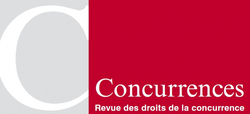
Référence complète : Cohen, E., Aides d'État, résolution bancaire et assouplissement quantitatif, Revue Concurrences, n°4-2016, pp. 1-3.
Les étudiants Sciences Po peuvent consulter l'article via le drive, dossier " MAFR - Régulation & Compliance "
June 17, 2011
Publications
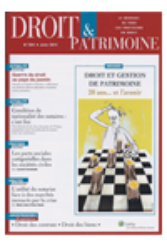
Référence complète : FRISON-ROCHE, Marie-Anne, L’utilité du notariat face à des marchés menacés par la crise, Droit & Patrimoine, Lamy, n°204, juin 2011, p.38-42.
Il faut appliquer la technique du "coût/avantage » pour mesure son utilité lorsque des marchés sont menacés par la crise. En effet, s’il y a des défaillances de marché, par exemple par la financiarisation de ceux-ci, ils ne peuvent plus supporter des risques qui s’avèrent systémiques. Or, l’incertitude des propriété" et la chaine d’engagements inconsidérés constituent des risques systémiques. Le notariat s’avère utile en ce qu’il produit des actes authentiques, actes normatifs produisant de l’incontestabilité, c’est-à-dire de la sécurité réduisant les risques sur les marchés. En outre, par ces diligences et l’organisation disciplinaire de la profession, le notaire assure la plus juste coïncidence entre le negotium et l’instrumentum, ce qui garantit ou restaure sur les marchés la confiance, qui en est le bien commun.
Lire le résumé de l'article ci-dessous.
March 2, 2011
Thesaurus : Doctrine
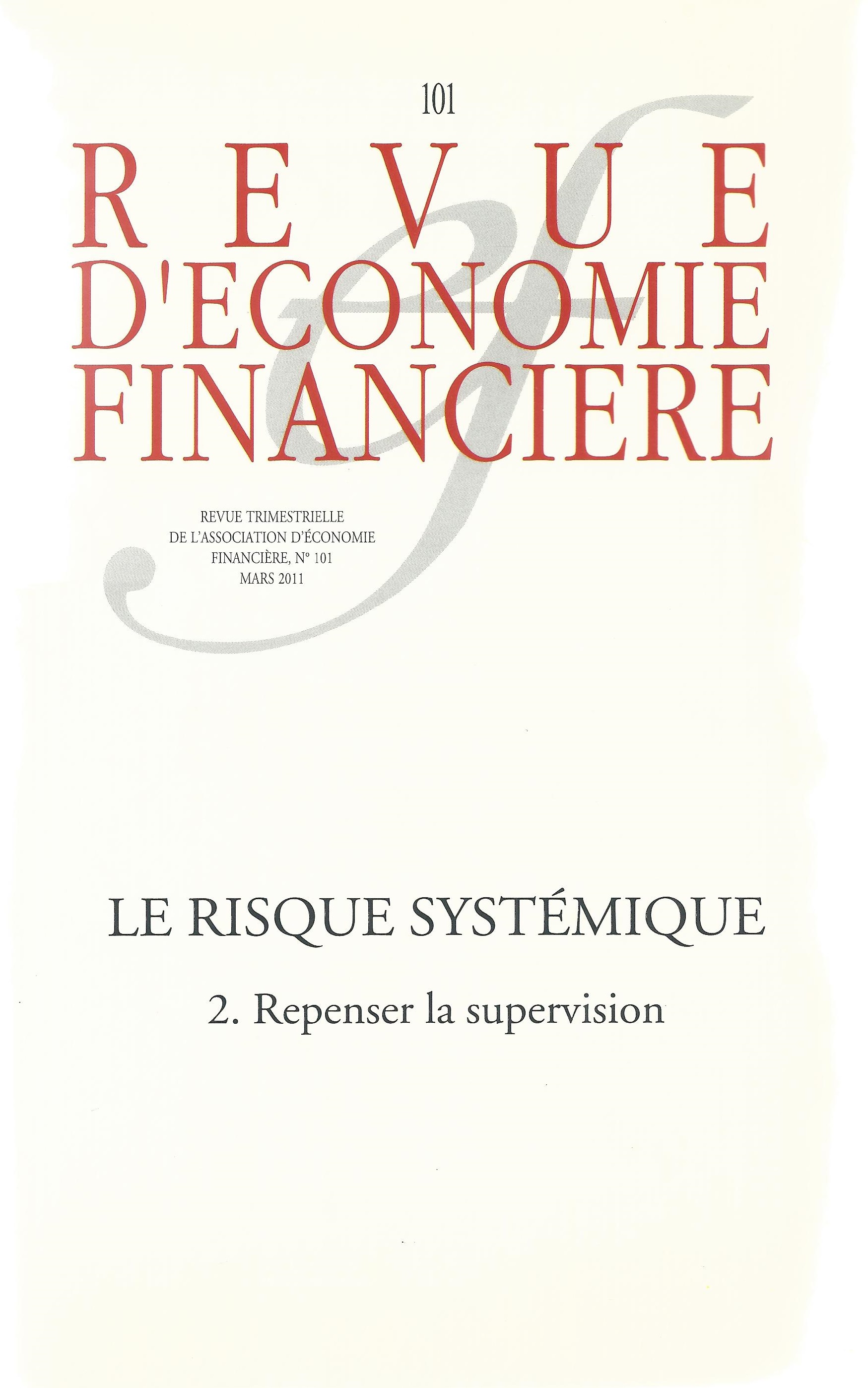 Paru en 2011, ce numéro thématique porte sur "La supervision" au regard du risque systémique, tandis que le précédent portait sur "La régulation" au regard de ce même thème.
Paru en 2011, ce numéro thématique porte sur "La supervision" au regard du risque systémique, tandis que le précédent portait sur "La régulation" au regard de ce même thème.
Il en ressort, pour éviter la prochaine crise, la volonté d'étendre la supervision, notamment aux "non-banques", comme les compagnies d'assurance, et de la renforcer, notamment quant aux moyens de contrôle, de surveillance et de sanction des Autorités de supervision.
Oct. 6, 2010
Conferences
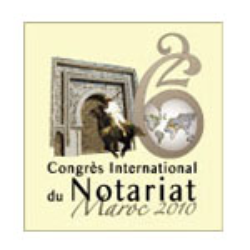
Référence complète : FRISON-ROCHE, Marie-Anne, Le notaire présente-t-il une utilité lorsque des marchés sont menacés par la crise ?, in Prévention des crises : règles, contrôle, transparence, 6 octobre 2010 Marrakech, Maroc.
Le Congrès International du Notariat consacre son XXVIièm congrès au thème de la prévention des crises, en s’attachant plus particulièrement à ce que peut représenter aujourd’hui l’acte authentique sur les marchés.
A ce titre, la contribution vise à démontrer l’adéquation de l’acte authentique, en tant qu’il dispense les agents économiques de la preuve, et s’accorde ainsi au marché, la sécurité étant apportée à celui-ci par l’intermédiation notariale, le notaire en devenant en matière immobilière le régulateur qui s’assure que la fiction sur laquelle repose l’incontestabilité de l’acte authentique, n’est pourtant pas en trop distorsion avec la réalité.
Sept. 23, 2009
Conferences

March 18, 2009
Teachings : Direction de thèses
► Référence : Frison-Roche, M.-A., direction de la de la thèse de Vincent Catillon, Le droit et le risque financier , Université Paris-Dauphine , soutenue en 2009.
Jan. 25, 2005
Publications
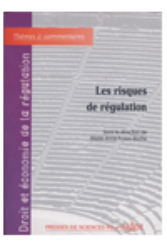
► Résumé de l'ouvrage : Cet ouvrage correspond au troisième volume de la collection consacrée au « droit et économie de la régulation », crée par Marie-Anne Frison-Roche. Ce volume fait suite à un premier qui était consacré aux questions de légitimité et à un deuxième portant sur les règles et les pouvoirs. Il sera suivi par trois autres volumes, le volume 4 étant consacré aux engagements, le volume 5 étant consacré aux responsabilités, et le volume 6 ayant trait à la régulation de la santé.
Cet ouvrage sur la crise, édité en 2005, c'est-à-dire deux ans avant les premiers événements de la crise financière mondiale, a pour ambition de restituer non pas tant les risques qui sont l’objet d’une régulation, par exemple les risques financiers ou les risques écologiques, mais de poser que la régulation elle-même est source de risque. En effet, la régulation peut être incertaine, les régulateurs peuvent commettre des erreurs, il peut même y avoir des fautes de régulation, de sorte que c’est de la régulation que sort la crise. S’articule alors un cercle vicieux entre les risques inhérents aux systèmes régulés, puisque c’est leur présence qui justifie l’appareillage régulatoire, et les risques de régulation, de nature différente, souvent de nature scientifique ou institutionnelle, qui fait que la régulation, loin d’éteindre les risques, les embrase.
___
C’est pourquoi en préalable l’ouvrage débute par une contribution d’économiste qui étudie l’hypothèse d’une « crise de régulation ». Les auteurs soulignent notamment que si le risque est inhérent au secteur, la régulation n’est pas de soi une activité risquée, c’est sa défaillance qui crée le risque. Dès lors, l’intervention du régulateur est problématique, car il peut éteindre la crise ou bien parce qu’il en est la source et ne se reprend pas, la faire perdurer ou l’accroître. Le régulateur n’a pas à poursuivre un objectif de risque 0 du secteur mais doit l’encadrer par sa capacité d’engagement propre et de la responsabilité des opérateurs. Le régulateur doit recevoir des incitations adaptées et ne pas être victime de capture tandis que l’Etat doit veiller à un design institutionnel efficace pour garantir l’indépendance du régulateur. Dans ce même préalable, une contribution de science politique montre que la crise est intime du politique, en ce qu’il fait vaciller celui-ci, la menace de la crise étant gérée par le politique d’une façon préventive. L’enjeu politique est de déterminer celui qui a le pouvoir de désigner ce qui constitue la menace. Dans la mesure où cette simple menace pourrait entraver la liberté, c’est à l’individu de la transformer en prescription et non pas à la loi, la transparence étant un moyen suffisant de gestion politique des crises. Enfin le risque est politique, il est logique qu’il figure dans la constitution qui fonde celui-ci.
La première partie de l’ouvrage porte sur les risques de systèmes, à travers l’hypothèse de la « crise générale ». Il y est démontré que dans le secteur bancaire et financier, il y a une articulation très forte entre régulation et crise puisqu’en la matière, la régulation a pour objet la prévention puis la gestion et la sortie des crises. L’auteur insiste sur le fait que sans doute, dans d’autres secteurs, notamment industriels, certaines entreprises ont une taille et une action si déterminante pour leur secteur, que le risque systémique existe pareillement et qu’une régulation analogue devrait être considérée. Dans le secteur énergétique, l’exemple gardé à l’esprit de chacun de la « crise californienne » est étudié pour démontrer qu’elle ait été causée par les défaillances de réformes concurrentielles de l’électricité qui furent opérées et du mauvais ajustement avec les autres régulations, notamment environnementales, ainsi qu’avec les comportements sociaux (gestion de la chaleur et de la climatisation). La crise californienne est donc bien une crise de régulation. Le risque sanitaire est lui aussi un objet de régulation car la sécurité des aliments, par le mécanisme des chaines des chaines de distribution, les contaminations, les interactions entre l’agriculture, l’alimentation et la santé, font qu’une régulation globale est nécessaire. Une trop grande fragmentation de ces régulations ou le fait qu’elles soient organisées d’une façon très différente pour ces divers objets pourtant intimement lié constitue un risque de régulation.
C’est pourquoi la contribution suivante met en valeur que d’une façon générale la régulation doit être utilisée comme mode de prévention des crises. Puisque la régulation se définit comme de la concurrence à laquelle s’ajoute autre chose, cette « autre chose » peut être le risque. Mais les risques sont extrêmement divers suivant qu’il s’agit de finance, de santé ou d’électricité, le risque de régulation pouvant provenir de l’hétérogénéité du risque. Dès lors, faut-il simplement utiliser la régulation pour prévenir le risque, Alors que la régulation se soucie certes de l’équilibre vis-à-vis de la concurrence mais n’intègre pas la très forte incertitude qui caractérise le risque. C’est ainsi que la transparence de la régulation ne suffit sans doute pas et qu’il convient de préférer le très puissant principe de communication qui soutient le principe de précaution. Mais l’on peut aussi demander au régulateur de prendre en charge cette gestion des risques, si l’Autorité de régulation est l’institution la plus adéquate pour le faire. Or, l’indépendance qui la caractérise n’est pas centrale dans la prévention des risques et la multiplicité des régulateurs contrarie la centralisation de l’information, ce qui constitue un risque. La contribution suivante, économique, étudie le moment de la sortie de crise, moment particulièrement risqué quel que soit le secteur dont il s’agit.
La contribution souligne que le nombre de crises de la régulation a augmenté, peut-être parce que nous sommes en transition entre deux types de système économique et qu’en outre, le fonctionnement court-termiste dans les régulations crée des risques, notamment à travers les conflits d’intérêts. Il peut y avoir risque lorsqu’une régulation a été mise en place, en considération des circonstances qui changent, par exemple la transformation radicale de l’entreprise dominante qui oblige l’adaptation de la régulation que le régulateur ne peut seul infléchir. D’une façon plus générale, il y a crise de régulation quand le régulateur n’arrive plus à satisfaire toutes les missions contraignantes qui lui sont imposées. La perspective de crise du secteur ou de la régulation ayant un effet incitatif sur les opérateurs, le régulateur doit s’adapter, faute de quoi il entre en crise. L’essentiel demeure la capacité d’engagement du régulateur, de l’Etat et de la société même à travers la crise, ce qui en conséquence fait demeurer stables les comportements des opérateurs. Il n’est pas inconcevable si le régulateur est dépassé et ne peut plus imposer le respect des engagements, ni à lui-même ni à autrui, de prévoir une sorte de « Haute Autorité de la régulation » qui le suppléerait en cas de crise, pour protéger le politique des groupes de pression et imposer le respect des engagements.
La deuxième partie du volume porte sur un risque particulier de la régulation, qui est l’incohérence. Le volume met en lumière la réponse à ce risque qui doit être l’ « interrégulation ». Elle vise à montre que pour appréhender les risques de systèmes les institutions, avec plus ou moins de systèmes, se mettent elles-mêmes en "interrégulation". Pour l'instant, elles le font relativement peu, d'une part parce qu'elles sont bloquées par le caractère clos que sont les différents systèmes juridiques, construits sur le territoire et non pas sur le risque qui est relativement indépendant de celui-ci, et d'autre part parce que la conscience de la nécessité et de l'efficacité de l'interrégulation est encore faible. Pour l'instant, cela relève encore quasiment de "l'hypothèse", pour traduire quelques réalités éparses, plutôt procédurales, voire simplement factuelles entre régulateurs ou entre juges, assez peu encore intersectorielles.
____
Accéder aux présentations des 3 articles de Marie-Anne Frison-Roche dans cet ouvrage :
📝 L’hypothèse de l’interrégulation.
📝L’office de règlement des différends, entre régulation et juridiction,
📝Arbitrage et droit de la régulation.
_________

Oct. 20, 2003
Organization of scientific events
May 11, 2000
Conferences